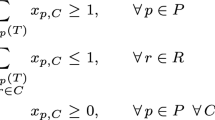Abstract
We study the max–min fair allocation problem in which a set of m indivisible items are to be distributed among n agents such that the minimum utility among all agents is maximized. In the restricted setting, the utility of each item j on agent i is either 0 or some non-negative weight \(w_j\). For this setting, Asadpour et al. (ACM Trans Algorithms 8(3):24, 2012) showed that a certain configuration-LP can be used to estimate the optimal value to within a factor of \(4+\delta \), for any \(\delta >0\), which was recently extended by Annamalai et al. (in: Indyk (ed) Proceedings of the twenty-sixth annual ACMSIAM symposium on discrete algorithms, SODA 2015, San Diego, CA, USA, January 4–6, 2015) to give a polynomial-time 13-approximation algorithm for the problem. For hardness results, Bezáková and Dani (SIGecom Exch 5(3):11–18, 2005) showed that it is \(\mathsf {NP}\)-hard to approximate the problem within any ratio smaller than 2. In this paper we consider the \((1,\epsilon )\)-restricted max–min fair allocation problem in which each item j is either heavy \((w_j = 1)\) or light \((w_j = \epsilon )\), for some parameter \(\epsilon \in (0,1)\). We show that the \((1,\epsilon )\)-restricted case is also \(\mathsf {NP}\)-hard to approximate within any ratio smaller than 2. Using the configuration-LP, we are able to estimate the optimal value of the problem to within a factor of \(3+\delta \), for any \(\delta >0\). Extending this idea, we also obtain a quasi-polynomial time \((3+4\epsilon )\)-approximation algorithm and a polynomial time 9-approximation algorithm. Moreover, we show that as \(\epsilon \) tends to 0, the approximation ratio of our polynomial-time algorithm approaches \(3+2\sqrt{2}\approx 5.83\).



Similar content being viewed by others
References
Annamalai, C., Kalaitzis, C., Svensson, O.: Combinatorial algorithm for restricted max–min fair allocation. In: Indyk, P. (ed.) Proceedings of the Twenty-Sixth Annual ACM-SIAM Symposium on Discrete Algorithms, SODA 2015, San Diego, CA, USA, 4–6 January 2015, pp. 1357–1372. SIAM (2015)
Asadpour, A., Feige, U., Saberi, A.: Santa claus meets hypergraph matchings. ACM Trans. Algorithms 8(3), 24 (2012)
Asadpour, A., Saberi, A.: An approximation algorithm for max-min fair allocation of indivisible goods. In: Johnson, D.S., Feige, U. (eds.) Proceedings of the 39th Annual ACM Symposium on Theory of Computing, San Diego, California, USA, 11–13 June 2007, pp. 114–121. ACM (2007)
Bansal, N., Sviridenko, M.: The Santa Claus problem. In: Kleinberg, J.M. (ed.) Proceedings of the 38th Annual ACM Symposium on Theory of Computing, Seattle, WA, USA, 21–23 May 2006, pp. 31–40. ACM (2006)
Bezáková, I., Dani, V.: Allocating indivisible goods. SIGecom Exch. 5(3), 11–18 (2005)
Chakrabarty, D., Chuzhoy, J., Khanna, S.: On allocating goods to maximize fairness. In: 50th Annual IEEE Symposium on Foundations of Computer Science, FOCS 2009, 25–27 October 2009, Atlanta, Georgia, USA, pp. 107–116. IEEE Computer Society (2009)
Chakrabarty, D., Khanna, S., Li, S.: On (1, epsilon)-restricted assignment makespan minimization. In: Indyk, P. (ed.) Proceedings of the Twenty-Sixth Annual ACM-SIAM Symposium on Discrete Algorithms, SODA 2015, San Diego, CA, USA, 4–6 January 2015, pp. 1087–1101. SIAM (2015)
Feige, U.: On allocations that maximize fairness. In: Teng, S.-H. (ed.) Proceedings of the Nineteenth Annual ACM-SIAM Symposium on Discrete Algorithms, SODA 2008, San Francisco, California, USA, 20–22 January 2008, pp. 287–293. SIAM (2008)
Goemans, M.X., Harvey, N.J.A., Iwata, S., Mirrokni, V.S.: Approximating submodular functions everywhere. In: Mathieu, C. (ed.) Proceedings of the Twentieth Annual ACM-SIAM Symposium on Discrete Algorithms, SODA 2009, New York, NY, USA, 4–6 January 2009, pp. 535–544. SIAM (2009)
Golovin, D.: Max-min fair allocation of indivisible goods. Carnegie Mellon University Technical Report. CMU-CS-05-144 (2005).
Haeupler, B., Saha, B., Srinivasan, A.: New constructive aspects of the lovasz local lemma. In: 51st Annual IEEE Symposium on Foundations of Computer Science, FOCS 2010, 23–26 October 2010, Las Vegas, Nevada, USA, pp. 397–406. IEEE Computer Society (2010)
Haxell, P.E.: A condition for matchability in hypergraphs. Graphs Comb. 11(3), 245–248 (1995)
Khot, S., Ponnuswami, A.K.: Approximation algorithms for the max-min allocation problem. In: APPROX-RANDOM, Lecture Notes in Computer Science, vol. 4627, pp. 204–217. Springer (2007)
Lenstra, J.K., Shmoys, D.B., Tardos, É.: Approximation algorithms for scheduling unrelated parallel machines. Math. Program. 46, 259–271 (1990)
Polacek, L., Svensson, O.: Quasi-polynomial local search for restricted max–min fair allocation. In: ICALP (1), Lecture Notes in Computer Science, vol. 7391, pp. 726–737. Springer (2012)
Svensson, O.: Santa claus schedules jobs on unrelated machines. In: Fortnow, L., Vadhan, S.P. (eds.) Proceedings of the 43rd ACM Symposium on Theory of Computing, STOC 2011, San Jose, CA, USA, 6–8 June 2011, pp. 617–626. ACM (2011)
Author information
Authors and Affiliations
Corresponding author
Additional information
A preliminary version of this paper appeared in the 27th International Symposium on Algorithms and Computation (ISAAC 2016). This research is supported in part by the Hong Kong RGC Grant 17202715.
Rights and permissions
About this article
Cite this article
Chan, TH.H., Tang, Z.G. & Wu, X. On (1, \(\epsilon \))-Restricted Max–Min Fair Allocation Problem. Algorithmica 80, 2181–2200 (2018). https://doi.org/10.1007/s00453-018-0407-8
Received:
Accepted:
Published:
Issue Date:
DOI: https://doi.org/10.1007/s00453-018-0407-8




